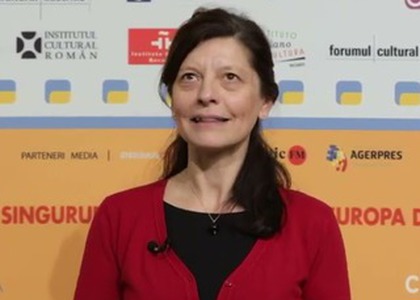> [Archived] Interviews

Interview with Laura Napolitano, director of the Italian Institute of Culture
The concerts on May 4th and 5th at the Romanian Athenaeum were organized with the support of the Italian Institute of Culture, which you lead. Thus, conductor Donato Renzetti and virtuoso guitarist Aniello Desiderio return to Romania. How were the performers chosen, Ms. Laura Napolitano?
I am very happy and proud to be a partner of these two events that will take place at the Romanian Athenaeum. In fact, I did not choose the two musicians, but they were proposed by the director of the "George Enescu" Philharmonic. We are very happy that the institution made this choice because the conductor Donato Renzetti and the guitarist Aniello Desiderio are really great musicians, important members of the Italian music world. Donato Renzetti is a renowned conductor who has led many orchestras all over the world, and guitarist Aniello Desiderio has performed with important orchestras. I think they will have a nice evolution together.
The program of the two evenings includes the Concierto de Aranjuez for guitar and orchestra by Joaquin Rodrigo and the Second Symphony by Alfredo Casella, dedicated to George Enescu. What is the composer's place in Italian culture?
Casella is a very important musician, being a virtuoso pianist as well as a composer. He is part of the generation of composers born around 1880, consisting of Alfredo Casella, Francesco Malipiero, Ottorino Respighi, Ildebrando Pizetti, Franco Alfano and so on. They represent the generation of musicians who tried to eliminate the traditional musical elements of Italian opera, in fact of melodrama, a genre that predominated in Italian musical creation in the 80s and 90s of the 19th century, but also at the beginning of the 20th century , through the representatives of Italian opera, Verdi and Puccini. So the aforementioned group tried to chart a new direction in Italian music, one directed towards the symphonic or chamber genres. Casella wrote three symphonies and I think it is important that the public in Bucharest know this Symphony II because Casella was forgotten for a while after his death in 1947. He was recognized in the first half of the 20th century, but then he experienced a period when his music was absent from concert programs. The reason for this omission I think was his political orientations because, even if he was not fascist, Casella did not oppose this system either, adopting a dissident attitude. He probably has this stain of not being a partisan, a fact that influenced the visibility of his creation for a while, but, nevertheless, his artistic value is indisputable. So I think it's important that his music comes back on stage.
What do you think will be the impact of a concert that brings to the public's attention two Italian performers and a representative symphony for Italian music, dedicated to a Romanian composer?
I think these two concerts will have a big impact because both the conductor and the soloist are very good musicians, and the audience will have the opportunity to discover the best Italian musicians of the moment. Also, as I said earlier, I think it is necessary for listeners to get in touch with Casella's Symphony No. 2, because it is an important work, which unfortunately has not been performed enough, conductor Gianandrea Noseda making the first recording of the symphony only in 2015. So, I am glad that we can bring to the attention of the Romanian public the creation of this remarkable musician and composer.
Translated by Cosmin-Ionuț Petriea,
University of Bucharest, Faculty of Foreign Languages and Literatures, MTTLC, year I
Corrected by Silvia Petrescu














